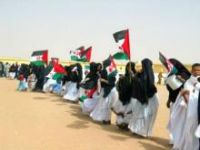Decolonization of Western Sahara, the world's debt to the Saharawi people
The decolonization of Western Sahara is one of the most brutal disputes on the agenda called "international community". Since the 1970s, that northwest African area rich in resources has been occupied by the Kingdom of Morocco, which advanced on the territory after the controversial withdrawal of the colonial power, Spain. In Brazil, the struggle of the Saharawi people for self-determination is still little discussed. Hence the commitment of forces engaged in international solidarity to bring the matter to debate.

Moara Crivelente *
In 1960 the United Nations Organization adopted the Declaration on the Guarantee of Independence to Colonial Countries and Peoples.
At least 44 more resolutions of the General Assembly followed the cue to address the issue. The document is one of the bases of the argument for the Saharawi people - in defense of their right to self-determination - represented by the People's Liberation Front of Saguia al-Hamra and Rio de Oro (Polisario Front), founded in 1973.
At that time, the armed combat - suspended with the ceasefire in the 1990s - was a national struggle for liberation against Spanish colonization and when the colonial power withdrew, the Polisario Front proclaimed in February 1976, the Saharawi Arab Democratic Republic (SADR).
The Kingdom of Morocco had already negotiated with the Spanish Kingdom, however, a controversial and unfounded succession to occupy Western Sahara and incorporate it into its territory. An advisory opinion of the International Court of Justice issued in 1975said there was no legal basis to justify the Moroccan claim over the region.
Still, powers like the European Union (EU) hinder the advance of the Saharawi struggle and legitimize the Moroccan occupation by vested trade agreements. One example is the exploitation of Saharawi fishing zone, one of the richest in the world. In 2013, in a commercial fishing protocol, the EU negotiated the Moroccan production, although more than 70% of fishing included in the term derives from the Saharawi waters. Literally, pillage. Other strategic resources looted from the Saharawis are phosphate, uranium, gas, lead, titanium, gold, zinc and oil, whose reserves are not yet known exactly.
Over 165,000 Sahrawis live in four camps in the Algerian region of Tindouf. In the liberated zone of Western Sahara, a narrow strip defended by the Polisario Front, live more than 30 thousand people curtailed from the rest of their territories by a wall of more than 2,700 kilometers long, guarded by seven million landmines and thousands of Moroccan soldiers . In addition, the persecution of human rights defenders and journalists is performed daily, with the brutal repression of demonstrations and the detention of Saharawis and Moroccans turned into political prisoners. Suffice it to say that over 400 Saharawis are missing.
About 80 countries have recognized the Saharawi Arab Democratic Republic. During a recent public hearing at the National Foreign Affairs and Defense Committee of the Brazilian House of Representatives, the president of the Brazilian Center of Solidarity for the Peoples and Struggle for Peace (Cebrapaz) Socorro Gomes defended the recognition of SADR by Brazil, whose official position is still the support for "dialogue between the parties" to a negotiated solution.
The UN maintains in the occupied territories the United Nations Mission for the Referendum in Western Sahara (MINURSO), which, since 1991, has as its mandate the supervision of a referendum already set by Resolution 690 of the Security Council for the Saharawi people to determine their own destiny. Morocco, however, rejects the referendum and offers the Western Sahara the status of "autonomous region", integrated into the Kingdom. Even with the presence of MINURSO, violations of human rights continue disseminated.
A delay of more than four decades in the process of decolonization and over two decades for self-determination adds to the persecution and oppression of the Saharawi people in their own territories. To strengthen their cause in Brazil, debates such as those held with the Polisario Front representative in Brazil, Mohamed Laarosi Bahia - on Thursday (21) at USP and Friday (22) in Barão de Itararé, this organized by the nucleus São Paulo do Cebrapaz - are contributions of social movements sympathetic to the struggle of the Saharawi people who need support, so that this oppressive condition can be reported, understood and addressed.
* Political Scientist politics, journalist and Member of the Brazilian Center of Solidarity with the Peoples and Struggle for Peace (Cebrapaz), advising the president of the World Peace Council.
Translated from the Portuguese version
of Pravda.Ru
By Olga Santos
Subscribe to Pravda.Ru Telegram channel, Facebook, RSS!


